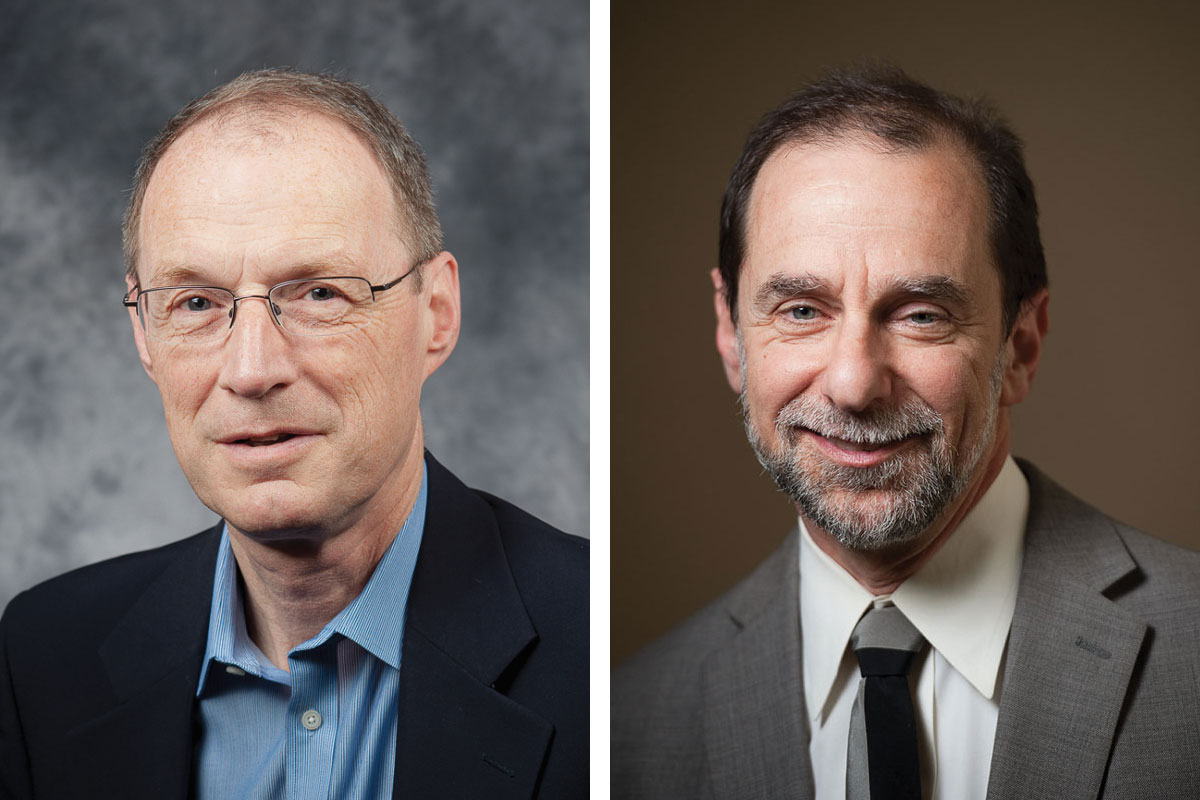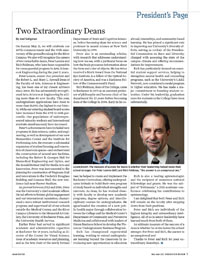President’s Page
 LEADERSHIP: The measure of success for deans is whether their leadership helped make their school stronger. For Peter Lennie (left) and Rich Feldman, “the answer is an unequivocal yes.” (Photo: Adam Fenster)
LEADERSHIP: The measure of success for deans is whether their leadership helped make their school stronger. For Peter Lennie (left) and Rich Feldman, “the answer is an unequivocal yes.” (Photo: Adam Fenster)On Sunday May 21, we will celebrate our 167th commencement and the 90th anniversary of the groundbreaking for the River Campus. We also will recognize the careers of two remarkable deans, Peter Lennie and Rich Feldman, who have been responsible for consequential progress in Arts, Sciences & Engineering during the past 11 years.
Peter Lennie, senior vice president and the Robert L. and Mary L. Sproull Dean of the Faculty of Arts, Sciences & Engineering, has been one of my closest advisors since 2006. He has substantially strengthened Arts, Sciences & Engineering by adding more than 60 new faculty. This year, undergraduate applications have risen to more than 18,000, the highest in our history, while our entering student board scores have increased from the 87th to 96th percentile. Our populations of underrepresented minority students and international students simultaneously have increased.
Peter’s achievements have included new programs in data science, optics, and engineering, as well as development of our new Humanities Center and the Institute for Performing Arts. He oversaw a substantial expansion of student housing and renovation of classroom spaces—and orchestrated the construction of several new facilities, including the Robert B. Goergen Hall for Biomedical Engineering and Optics, and the Ronald Rettner Hall for Media Arts and Innovation. Peter was instrumental to the planning for construction of Wegmans Hall and renovations to the Frederick Douglass Building and Genesee Hall, the new residence hall near Fauver Stadium.
As provost between 2012 and 2016, Peter was the University’s chief academic officer. He led efforts to bolster global engagement and our international reputation; championed a more robust institutional research program; and supervised all of our schools outside the Medical Center, and the River Campus Libraries to the Memorial Art Gallery, the University of Rochester Press, and the University Health Service.
Earlier Peter had served in significant academic and administrative capacities at Rochester for 16 years, including as director of the Center for Visual Science, dean of academic resources and planning, and as the first chair of the newly formed Department of Brain and Cognitive Sciences, before becoming dean for science and professor in neural science at New York University in 1999.
Peter also is an outstanding scholar, with research that addresses understanding how we see, with a particular focus on how the brain processes information about the form and color of objects. He has twice received a Merit Award from the National Eye Institute, is a fellow of the Optical Society of America, and was a Harkness Fellow of the Commonwealth Fund.
Rich Feldman, dean of the College, came to Rochester in 1975 as an assistant professor of philosophy and became chair of the department for 13 years before becoming dean of the College in 2006. Early in his career, he helped to create and implement the Rochester Curriculum, offering undergraduates latitude to build their own program of study based on individual strengths and interests. As dean, he has worked closely with faculty to develop new academic programs, degree options, and interdisciplinary courses for undergraduates. He spearheaded the creation of a new public health major through collaboration between the College and the Medical Center’s Department of Community and Preventive Medicine and collaborated with leaders of Simon Business School to develop the Florescue Undergraduate Business Program.
Rich has championed experiential learning, working to extend undergraduate learning beyond the classroom by introducing new opportunities in education abroad, internships, and community-based learning. He has played a significant role in improving our University’s diversity efforts, serving as cochair of the Presidential Commission on Race and Diversity, charged with assessing the state of the campus climate and offering recommendations for improvement.
Rich has particularly focused on essential student support services, helping to strengthen mental health and counseling programs, such as the University’s CARE Network, now considered a model program in higher education. He has made a major commitment to boosting student retention. Under his leadership, graduation rates for students in the College have risen substantially.
Rich is also a leading epistemologist and the recipient of numerous national fellowships and grants. He was the subject of “Feldmania,” a 2011 academic conference celebrating his contributions to epistemology.
I am delighted that both Peter and Rich will remain on the faculty after stepping down from their positions.
Peter and Rich are individuals of the highest integrity and extraordinary intelligence. All of us in senior leadership have learned much from both of them.
An ultimate measure of the success of a dean is whether he or she leaves the school stronger. For Peter and Rich, the answer is an unequivocal yes!
Thanks to Peter and Rich for your extraordinary deanships.

